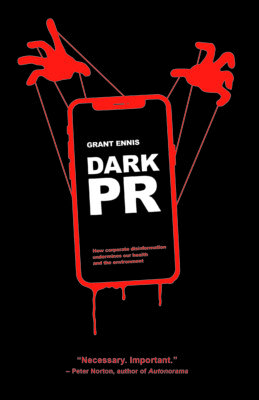Grant Ennis’ call for action on global health crises challenges perceived notions of corporate propaganda, government culpability, and political organization. Dark PR asks us to reconsider the public discourses we see on key issues such as global warming, obesity, and road deaths.

Dark PR
How Corporate Disinformation Harms Our Health and the Environment
Grant Ennis
Daraja Press
$21.00
paper
266pp
9781990263484
Despite arguing that personalizing political action disarms it, Ennis often introduces the subchapters of this book with personal anecdotes from his long career. The anecdotes serve an important function of grounding Ennis’ writing as the stakes of the book are made clear. These devious frames are material in the sense that they affect real-world events. The frustration felt in many of these passages serves as a clear motivation for such a direct call for action. It is not surprising that the book, which focuses on how global crises are framed by corporate interests and other parties, was written during the initial waves of COVID-19.
While corporations are repeatedly mentioned, Ennis does not shirk from critiquing the shared culpability of governments in enabling corporate lies. What is curious, though, is how the book ambiguously defines the relationship between the two. The reasons for why any government might enable or even begin the subsidies in the first place is never discussed. In fact, the book never once mentions capitalism as in any way enabling, facilitating, or even causing this toxic relationship. Despite tackling these various crises on a global level, the frame of cause-and-effect seems quite narrow. A reason for this omittance may be the intended audience of this book – namely, everyone. Ennis hopes that by making these devious frames visible and focusing on specific policy targets, “leftwing, centrist, and rightwing citizens might all agree” on the political action necessary.
The second half of the book is dedicated to discussing productive citizen activism, and the ways in which corporate propaganda obfuscates types of activism that are genuinely productive. Ennis is gentle but firm in discussing how even well-intentioned people unwillingly or unknowingly play into corporate interests. It is perhaps unsurprising that actions such as “conscious consumption” and keeping track of individual “carbon footprints” have little effect on the structures causing these crises. What will no doubt unsettle readers is instead the burgeoning evidence presented that argues the inefficiency of protests and charitable organizations. The last subchapter, however, is dedicated to discussing the organizing approaches that can lead to successful global action, with examples drawn from existing groups.
The tone of the latter half of the book is far from hopeless. Instead, the incensed writing builds towards a powerful call to action. The path to genuine political change is treacherous. The devious frames utilized by corporations to suppress activism often plays on individualism and consumerism. The only way forward is organized, collective, and policy-focused action. Dark PR swings between carefully researched yet devastating facts and determined aspirations for a healthier collaborative future.mRb






0 Comments